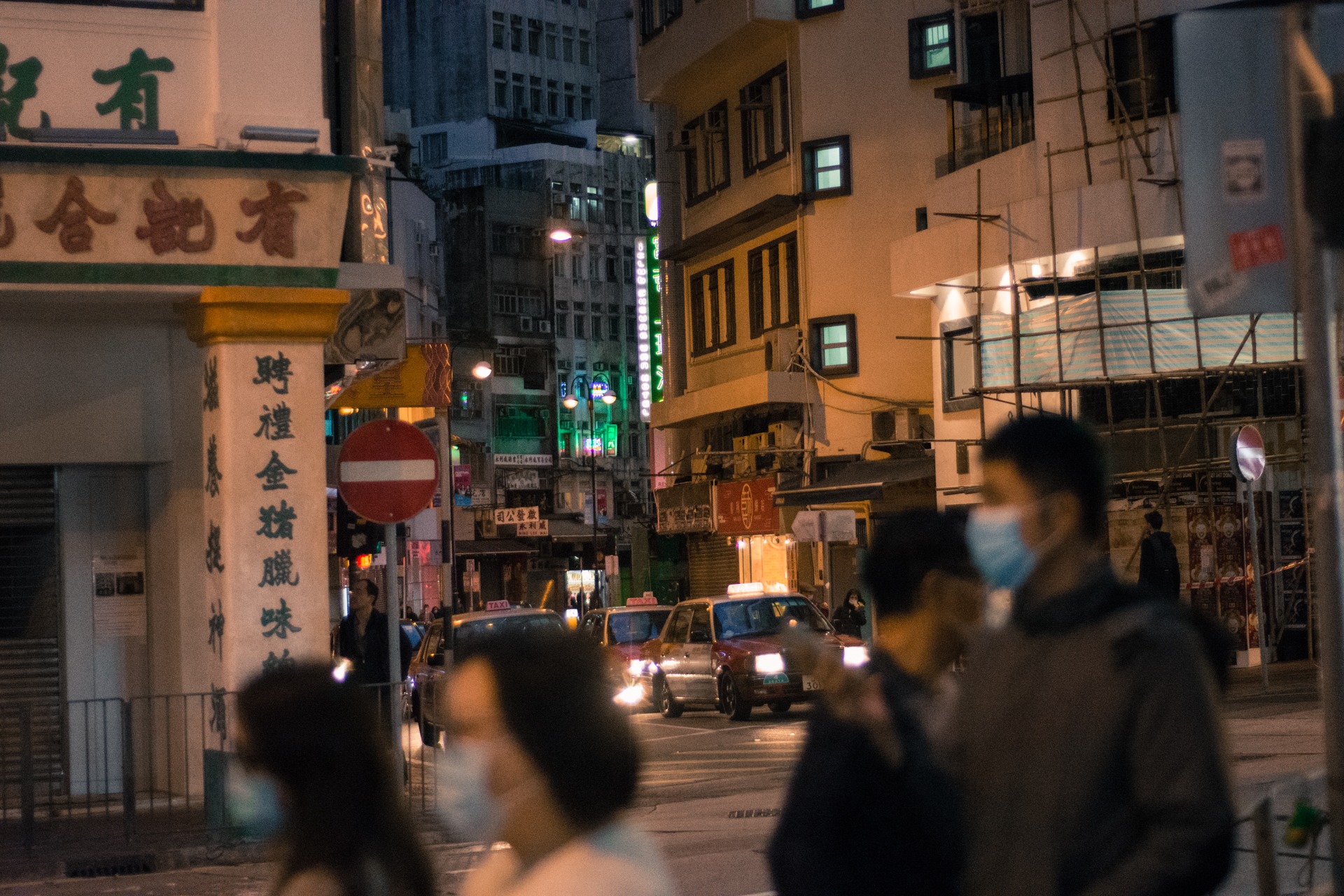Original: 五一宣言:抗疫不忘勞動人權!反剝削反壓迫!
Author: 工運圍爐1
Translators: WF, ZL, 翡翠廢青
Editor’s note: Hong Kong today is dominated by a COVID-19 infection and death rate that, per capita, is among the highest in the world. Popular discontent, suppressed for two years by the pandemic and the National Security Law, is fermenting in response to the government’s insistence on a strict “Zero COVID” policy. Government policy is perceived to be determined more by political factors—to ensure that Hong Kong remains compliant with mainland China’s own “Zero COVID” policy—than by the actual needs of the Hong Kong people.
This statement and its accompanying demands, issued by an anonymous group of Hong Kong workers and labor activists, identifies and analyzes the roots of the pandemic chaos as stemming from Hong Kong’s undemocratic and neoliberal political system. The new age of illiberalism and repression under the National Security Law has only strengthened the state-capital collusion at the heart of Hong Kong’s structural socioeconomic inequality, and empowered those in power—top politicians, officials, and their cronies in big business—to plunder and exploit with greater impunity.
The potential solutions to the contradictions and phenomena manifested by this crisis underscore the importance of rebuilding the bonds of organisation and solidarity to sustain a popular movement demanding social and political change.
In the face of the COVID-19 pandemic that began in 2020, the Hong Kong government has been completely ineffectual and helpless. As the economy stagnates due to the pandemic, the government has primarily focused on directing financial relief to the tycoons and big corporations. Some corporations have made massive profits during the pandemic, yet continue to receive hundreds of millions in government subsidies through the so-called “Employment Support Scheme.” Meanwhile, for workers in dire straits due to the pandemic, the “anti-epidemic subsidies” offered by the government are but a drop in the bucket.
Owing to the government’s chaotic pandemic control policies, much of Hong Kong’s grassroots working class is imminently threatened with unemployment, furloughing, or wage cuts. Those who manage to retain their jobs face precarious job conditions and the multifaceted pressures of life amidst the pandemic. For example, frontline medical workers are confronted with the unprecedented pressure of tens of thousands of new infections daily, with the elderly, infirm, and impoverished sick piling up unattended outside emergency rooms. Understaffed and overstretched, Hong Kong’s public healthcare system is on the verge of collapse. The public outcry for the government to categorize COVID-19 as an occupational disease has fallen on deaf ears.
The pandemic has exacerbated the problems of overwork and unpaid overtime. Care workers employed in hospitals, nursing homes, and institutions for the mentally handicapped, as well as those employed in the logistics industry are worked to the brink of exhaustion, to the detriment of their health and work-life balance. Under the pandemic, Hongkongers have had to choose between their livelihood and their life, underscoring the dire need for robust working hours legislation.
During the pandemic, many companies and shops have closed down, leading to the dismissal of many workers. This situation reminds us of how the previous government administration brought up the idea of cancelling the practice of using contributions to the Mandatory Provident Fund to count as part of an employee’s severance pay or long-term service pay, yet after five years there has been no legislative progress towards this end at all. Likewise, a community-wide retirement protection scheme, which has been petitioned by the people of Hong Kong for a whole decade, is completely without a trace.
In addition to creating an unprecedented amount of pressure for medical workers, the pandemic has also doubled the pressure experienced by carers who are looking after the elderly, infirm, and disabled at home. The Living Allowance for Low-Income Carers, which has long been riddled with problems, must be immediately improved in order to provide adequate support for carers that have consistently contributed unpaid labor.
Despite the grave circumstances of the pandemic, rental costs remain steep and unchanging. If the government were to even suggest legislation that would temporarily delay the “rent chasing” that property owners enact upon operators of specific industries, it would result in tremendous backlash from big property owners. Under the unbridled conditions of a pandemic, it is all the more necessary for the government to establish legislation that would limit the predatory behavior of the “profit-eating” classes, who take from the hard-earned wages of workers.
The existing laws provide insufficient protections for organizing unions. The Trade Unions Ordinance primarily serves to regulate the operations of unions. Unions can only develop healthily and effectively protect the rights of workers when improvements are made to the Trade Unions Ordinance, the right to operate unions independently and the right to strike are protected, and laws are established to regulate employers’ group negotiation rights.
Under the pandemic, we have witnessed how the government’s approach to managing the situation has been to just lead with political slogans and closely follow the dictates of the Central Committee. They have completely ignored the actual conditions of what has unfolded in Hong Kong and have also ignored the professional advice of medical experts and epidemiologists. The pandemic control measures that they have implemented are completely unable to address the actual needs of the people. This type of governance has led to utter chaos in terms of pandemic control policies, and by April, 2 million people have been infected with COVID-19, and over 9,000 have died.
The governance of the Hong Kong Special Administrative Region Government is in shambles, and the public and its workers bear the brunt of it. The Basic Law promises an orderly and gradual implementation of universal suffrage, but over half of 50 years has elapsed and the number of directly elected seats in the Legislative Council has not increased, but actually decreased—which amounts to disrespecting and even violating the Basic Law. The government should therefore implement universal suffrage immediately, without delay. If the government has other plans, then it should immediately announce the timetable for the implementation of universal suffrage, again without delay.
Our demands
1. Legislation to grant welfare benefits for the unemployed and underemployed.
2. The categorization of COVID-19 as an occupational disease, and the amendment of the Employment Ordinance to classify quarantine due to COVID-19 as paid sick leave.
3. Additional manpower for hospitals, nursing homes, and institutions for the mentally handicapped.
4. The immediate abolition of the Mandatory Provident Fund2compulsory saving scheme, which requires employees to give up 5% of their wages to MPF investment managers, and the establishment of universal retirement benefits.
5. The increase of caregiver’ allowances so to prioritize caregivers in need. Moreover, remove restrictions that prevent those eligible for the caregiver allowances from receiving other kinds of support.
6. Implement comprehensive rent control for residential, industrial, and commercial units.
7. Legislate thorough protections for trade unions, and establish collective bargaining rights.
8. Immediately implement an eight-hour work day.
9. Immediately announce timetable to implement direct elections for the Legislative Council, as well as enable the nomination of citizens and a one-person, one-vote system for the Chief Executive elections.
Footnotes
- lit. “the labor movement around the hearth”.
- The Mandatory Provident Fund (MPF) embodies the welfare financialization of retirement protection. Five percent of working Hongkongers’ salaries is siphoned into a privately managed trust run by the Mandatory Provident Fund Schemes Authority (MPFA), which makes investments in equity funds based on the input of the trustees. The pension scheme has been criticized for the trust’s exorbitant handling fees, which are well above market rate, as well as the objectionable nature of compulsorily making investments with Hongkongers’ pensions, which has sometimes resulted in losses, and are barred to them until they reach retirement age. Additionally, the practice of utilizing the funds that employers contribute towards MPF to count as part of an employee’s severance pay or long-service pay has been heavily criticized, as it constitutes a form of wage theft.




